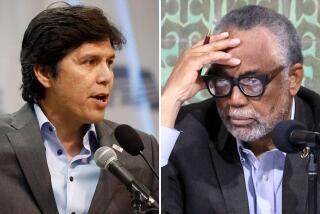Appointee Linked to Developer : Ethics: Member of a building appeals board voted on a project by a firm that had hired him. He also raised Bradley campaign funds from businesses with matters before his agency.
- Share via
One of Los Angeles Mayor Tom Bradley’s building department appointees last year voted on an apartment project involving a developer who had hired him, records and interviews show.
The Times also found that Patric Mayers, former president of the Building Advisory Appeals Board, helped raise political funds for Bradley from businesses with matters before his agency.
State law prohibits officials from voting on matters in which they have a financial interest, and it prohibits political appointees from soliciting campaign contributions from anyone with business before their agencies.
Mayers, who resigned earlier this year, said he did not knowingly do anything improper.
Bill Chandler, Bradley’s press spokesman, said late Wednesday that Mayers resigned from the board “after several items came to our attention. Our office has been advised by our attorneys that I cannot elaborate because this might be a personnel matter.”
He did not say what issues were involved, and Mayers could not be reached afterward for comment.
Questions about Mayers’ activities arose as the state Fair Political Practices Commission opened a preliminary inquiry into fund-raising activities by Bradley commissioners and staff that were reported by The Times.
“We are reviewing the matter and will have no further comment at this time,” said Sandra Michioku, an FPPC spokeswoman. She declined to comment on Mayers.
The FPPC is looking into disclosures by The Times on Sunday and Monday that Bradley’s staff operated a political fund-raising network in City Hall that used city telephones, secretaries, equipment and apparently staff time.
Also, city commissioners held fund-raisers in their homes that yielded thousands of dollars in campaign contributions from developers, lobbyists, contractors and other special interests with matters before their agencies. Aides and appointees raised at least $700,000 for Bradley campaigns in the past five years.
Bradley staff and commissioners generally have denied acting improperly, or have declined to comment.
Officials in the Los Angeles district attorney’s office and the Los Angeles Police Department said Wednesday they were continuing to confer about whether to open a criminal investigation of possible misuse of city resources.
Bradley has refused to be interviewed about the activities. His office on Wednesday reiterated the mayor’s earlier statement that aides and appointees were informed that city and campaign business should be kept separate.
Most of the disclosures by The Times involved Bradley’s campaigns for mayor in 1985 and 1989 and governor in 1986. The matters involving Mayers occurred last year.
Mayers, who owns a private consulting business, confirmed Wednesday he was paid up to $1,000 last year doing work for a Beverly Hills developer, Citistate Crossland Investments.
Greg Zack, a partner in Citistate, said Mayers had been paid for consulting work, although he declined to say when and how much.
City records show Mayers voted last December to recommend approval of Citistate’s request for relief from a building code requirement for ventilation on the firm’s four-story, 80-unit Normandie Avenue apartment project.
Mayers challenged the accuracy of official city records that showed him present at the meeting and voting on the Citistate project. But official notes taken at the time and officially approved minutes show Mayers made the motion to urge approval of Citistate’s request and voted for it.
Records show and Mayers said that he also solicited political funds for Bradley from Citistate and other building interests that had business with his commission.
At the request of a Bradley fund-raising consultant, Mayers said he organized an Encino fund-raiser for a Bradley-backed political committee in early 1989. Records show that later in 1989 he helped raise money for a legal defense fund that helped pay Bradley’s expenses in connection with ongoing investigations of his personal finances and official actions.
Public reports show that $1,000 was conveyed to the legal defense fund by Mayers in August, 1989, from former councilman and lobbyist Arthur K. Snyder. One month earlier, city records show, Mayers’ voted on the side of an Eagle Rock homeowners group that Snyder represented before Mayers’ board.
The homeowners were opposing a permit for a hilltop microwave transmitting facility. Snyder said the transmitter is about 200 yards from his home and he represented the homeowners free of charge.
Mayers said he sent out letters seeking donations for Bradley’s legal defense fund, but he denied that he solicited a donation from Snyder. Snyder said he could not recall how the donation was solicited.
Mayers solicited Thomas Safran & Associates for contributions while the company was seeking extensions on permits for a 241-unit low-cost apartment complex. The firm gave $500.
“Whatever I did, if it appears awry, I’m personally appalled,” said Mayers, who resigned from the building board earlier this year. “It never occurred to me there was a tie-in that could cause me grief.”
State law prohibits members of appointed boards soliciting donations of more than $250 from those with matters before them. The law also bans appointees for 12 months from voting on projects involving those who have paid them $250 or more in income.
Penalties can include fines and, in serious cases, criminal charges.
More to Read
Sign up for Essential California
The most important California stories and recommendations in your inbox every morning.
You may occasionally receive promotional content from the Los Angeles Times.













